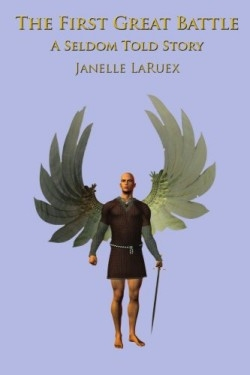The First Great Battle
A Seldom Told Story
Author Janelle LaRuex, proposes that society accept “the necessity of religion as a societal norm” and that evangelicals live out their faith in a variety of ways through prayer, reading the Bible and seeking God’s will on heaven and on earth. LaRuex believes that few Christians truly consider what God’s will in heaven is…which leads to unanswered questions and confusion regarding one’s faith. Further, this author suggests that only children with their naivety and purity of heart can understand scriptural principles as cited in Mark 10: 13-16, “And they were bringing children to Him so that He might touch them; and the disciples rebuked them. But when Jesus saw this, He was indignant and said to them, ‘Permit the children to come to Me; do not hinder them; for the kingdom of God belongs to such as these.’ Truly I say to you, whoever does not receive the kingdom of God like a child shall not enter it at all.”
LaRuex writes that throughout the ages people have asked questions and answered those questions with stories and speculations. In her text, she attempts a fictional account of what may have transpired in heaven prior to the fall of man as described in Genesis. The author’s didactic intention is to set up “thought provokers” or questions, then answer them at the close of text. Unfortunately, the writing technique is so convoluted and disconnected that the narrative path is a difficult one to follow. LaRuex’s prose is flowery and vague, more like independent random phraseology than a real story with a beginning, middle, and end.
Readers will find a brief description of LaRuex’s major characters listed prior to her storytelling. Characters include: prince of heaven (Christ), the great king (God), Dawn (daughter of light), Lucifer (son of morning), Gloria (glory), Pictius (pitch), Mercy (daughter of the great king), Zion (mother of Christ), the High Council (recorders of tasks/deeds), and Lilith, Passion, Lewd, Lascivious and Evictus (sons/daughters of Dawn and Pictius). Sadly, there are so many nonsensical tie-ins that even careful readers will be left wondering what exactly and where lay the point behind each very concise chapter.
No doubt that LaRuex can write imaginatively, but the overarching weakness of transitioning and communicating with purpose, for a purpose spoils this author’s original premise.
Reviewed by
Michele Howe
Disclosure: This article is not an endorsement, but a review. The publisher of this book provided free copies of the book and paid a small fee to have their book reviewed by a professional reviewer. Foreword Reviews and Clarion Reviews make no guarantee that the publisher will receive a positive review. Foreword Magazine, Inc. is disclosing this in accordance with the Federal Trade Commission’s 16 CFR, Part 255.

